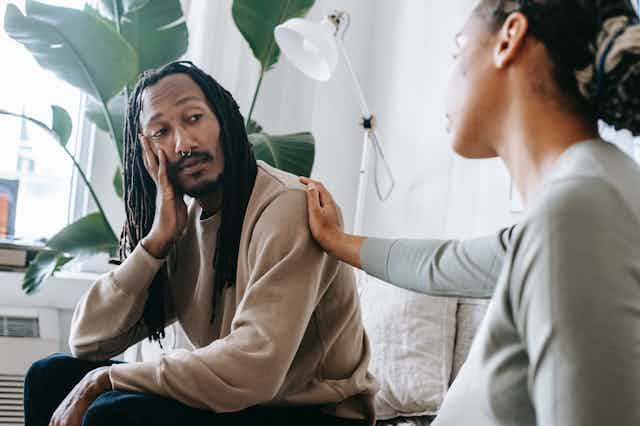Do you have a friend who responds to almost every anecdote you tell with “Oh my gosh, me too! This reminds me of when that happened to me.” Or perhaps you are that friend. Maybe you instinctively aim to bond with others by talking about experiences you’ve had that feel similar to what your friend has just shared.
In psychology, this is called “self-disclosure” – a habit of disclosing something about yourself to another person, often in an effort to forge a connection.
But while this practice feels incredibly natural to some (more commonly extroverts than introverts), it can rub others the wrong way, as a recent viral tweet showed:
Some furiously agreed, while others felt not responding to a friend’s story with your own experiences would almost violate the norms of conversation.
So why does self-disclosure elicit such strong reactions? And what can psychology tell us about this habit?
Read more: Now, let's talk about me: self-disclosure is intrinsically rewarding
Why do people use self-disclosure?
Self-disclosure is a bonding tool – a way of sharing part of yourself. It can deepen intimacy and friendships and makes you a bit vulnerable. That vulnerability can touch other people’s emotions, make them feel you trust them and can forge a connection.
Women typically do it more than men. Perhaps that is because women tend to be socialised to be allowed to be vulnerable or express they are not coping, whereas men are often socialised not to.
So why does it rub some people the wrong way?
Nuance is important here. Not all self-disclosure is helpful, and likewise I don’t think anyone is arguing a person should just sit there mute while one friend does all the sharing.
The goal is to have a sense of balance; effective self-disclosure is reciprocal. Jumping in too quickly with “Oh yes, that happened to me” can end up saturating conversation and make your friend feel they were never heard in the first place. It can be inadvertently invalidating and feel unbalanced.
A vast body of psychology research tells us that, fundamentally, humans want to feel heard. If your friend has just told you about some significant thing that happened to them, allow them space to express their feelings and their experience.
Another way a well-meaning self-disclosure can end up worsening imbalance is when one person shares an experience that, to them, feels equivalent – but it’s not. Your experience of the time you almost lost a loved one is not the same as your friend’s experience of actually losing a loved one.
Sometimes people jump in with advice and what, to them, feel like similar stories out of a misplaced effort to “fix” the first person’s problems.
But people’s contexts are different and their capacities are different.
Ironically, your effort to “help” may leave your friend with a sense of shame they are not able to solve their problem as easily as you did.
Grief can be a flashpoint
Grief can be a real flashpoint for this clash around self-disclosure. If a friend is talking about grief and your instinct is to jump in with your own experiences, please remember no two experiences of grief are the same.
Grief can be an incredibly isolating experience. In the acute aftermath people will swarm around you and you can feel very busy, but a few days or weeks later you are stuck with the grief while everyone else gets back to normal life.
Even close friends can panic and not know what to say after the immediate dust has settled. They may try to “help” by talking about their own experiences, or encourage a person to “move on” but this can end up invalidating the grieving person’s experience.
The safest thing is to listen and let a person who is grieving just feel their emotions.
It’s not a competition
Not every clash over self-disclosure is about grief, of course. Sometimes it can happen over seemingly banal things. You’re happy about a minor achievement, but after sharing it with a friend they say they did that, too.
If you’re an instinctive self-discloser, just be aware sharing your experiences too quickly after your friend can sometimes read as competitiveness (even if unintended).

Not all self-disclosure is wrong!
Not all self-disclosure is harmful. Sharing your lived experiences can form the basis of a great conversation and a meaningful connection. We don’t want to be in a position where we have to shrink our joy because we worry about how it will affect anyone and everyone.
At the end of the day, we need to let each other have joy, sadness, anger and all the emotions.
Giving each other the space to feel those emotions is key. When your friend tells their story, ask them a few questions about it. Give them time and space to reflect on their experience and how it affected them, before you jump in straight away with your own experience.
And remember that context is key: sometimes self-disclosure will deepen your connection, while other times talking about your experiences may not actually be all that helpful.
Read more: What do your earliest childhood memories say about you?


